| Reviews & Columns |
|
Reviews DVD TV on DVD Blu-ray 4K UHD International DVDs In Theaters Reviews by Studio Video Games Features Collector Series DVDs Easter Egg Database Interviews DVD Talk Radio Feature Articles Columns Anime Talk DVD Savant Horror DVDs The M.O.D. Squad Art House HD Talk Silent DVD
|
DVD Talk Forum |
|
|
| Resources |
|
DVD Price Search Customer Service #'s RCE Info Links |
|
Columns
|
|
|
L.A.―My Home Town
Reviewer's note: This review is based on a promotional screener disc (sans box and artwork), not a shelf-ready final product. Therefore, as per DVDTalk policy, no ratings for audio or video will be provided until a final product is received, at which time this review will be amended.
"I've made Los Angeles,
Into my hometown.
Here on the boulevard,
I've really put my roots down.
So I'll forget England's green.
I'll face life on the street.
Though it seems quite a mess,
I can make it all neat.
Oh, oh Yankee Doodle,
I love your Red, White, and Blue.
Give me a moment,
There's something I've got to do.
Forget the blazers and ties, enjoy the burgers and fries,
And let the old country fade, and welcome Mickey's parade.
And yet we're British,
Living here in L.A.."
A delicious vintage documentary. Scorpion Releasing, which is making a name for itself by putting out some intriguing, little-seen cult titles, has released L.A.―My Home Town (which Scorpion, for some unknown reason, has retitled L.A. is My Hometown in all promotional material), a 1976 documentary from the legendary BBC arts program Omnibus, starring one-time "British Invasion" pop idol Ian Whitcomb. Written by singer/composer/author Whitcomb, and directed by Geoffrey Haydon, L.A.―My Home Town is a light-hearted, bemused look at alien Whitcomb's willing assimilation into the laid-back Los Angeles/Hollywood culture, with sly asides about the waning hold that the "old country" has on the-then 350,000 Britishers living in Southern California. A full-length commentary track with Whitcomb is a nice bonus for this amusing doc.
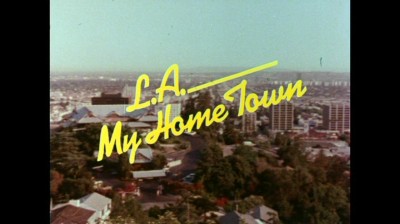
Some background for the uninitiated on Ian Whitcomb, up to this documentary, would be helpful at this point. Whitcomb, a university student at Trinity College in Dublin back in the early sixties, formed a R&B band, Bluesville, that had a record chart in the U.S. during the height of the "British Invasion." In the summer of 1965, Whitcomb's peripatetic, mocking single, You Turn Me On, peaked on the Billboard charts at #8, enabling the mop-haired Whitcomb to tour as an opening act for The Rolling Stones and The Kinks, appear at the Hollywood Bowl with The Beach Boys, and make guest appearances on TV shows like American Bandstand and Shindig. This brief bit of rock 'n' roll/pop fame, though, didn't last long ("I faded away pretty fast," Whitcomb recounts), and for the next ten years Whitcomb went back and forth between England and the U.S., continuing to record albums while morphing into a well-respected author (his 1972 book on American pop music, After the Ball, is still highly regarded today). After penning an article in the BBC magazine, The Listener in 1976, Whitcomb was invited to write and star in a documentary on his experiences living in L.A. for the BBC's premiere TV arts program, Omnibus. The result, the naughty, breezy L.A.―My Home Town, got him blackballed both by the British community in Los Angeles (who thought Whitcomb was making fun of them) and back in England, where viewers were shocked (and no doubt titillated) at the male and female nudity on display here.
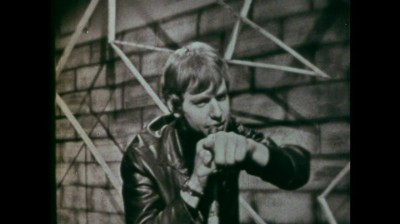
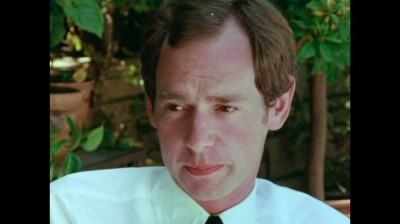
As an avowed Anglophile and lover of all vintage British television, a find like the daffy, obscure L.A.―My Home Town is most welcome, particularly when so much of that released vintage material seems to concentrate on fictional series and movies (for every one L.A.―My Home Town TV doc released, there has to be hundreds of Miss Marples and Poirots put out there on disc). Add to that this doc's cheery, sardonic attitude which seems to lightly mock all those BBC documentaries it emulates, and L.A.―My Home Town becomes not only an amusing spoof of the genre, but also a quietly telling, even poignant little window on this seemingly insignificant moment in both countries' timeline, as England's émigrés to America, blissing out in the hazy SoCal heat, slowly lose their connection to their homeland culture.
When L.A.―My Home Town starts out by asking the question, "How does a 35-year-old faded British rock star survive in modern L.A.?" we're pretty sure where this doc is going to, particularly after we see the self-deprecating Whitcomb wake up in his secluded-but-small Hollywood apartment and call his answering service...only to discover they don't remember him (and of course, there are no messages for him, either). When we see him call his more affluent neighbor for a morning swim in her pool (no answer here, either), and when he rides his tatty 10-speed bike to the local YMCA for a primitive workout in the dingy gym, we think we have L.A.―My Home Town all figured out: a look at a fish-out-of-water émigré who once tasted brief fame and who now scrambles in different circles for a buck (I love it when Whitcomb shows how "Hollywood" he's already become: he sums up his fitness instructor/aspiring actor thusly: "He's just done a Kojak, I believe.").
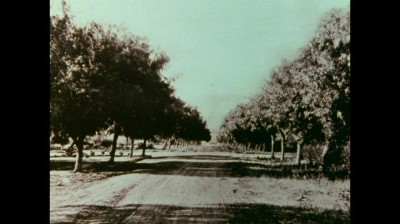
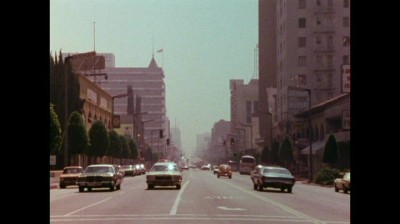
Surprisingly, L.A.―My Home Town then moves to almost completely ignore this clichéd proposition to instead meander around lush Los Angeles as Whitcomb seeks out the last remnants of British culture. Far from fitting into the stereotype of an alien who is at odds with his new country, the charming, apparently satisfied Whitcomb has come to love the sunny, decadent Hollywood lifestyle, as have apparently most of the Britishers he knows. Whitcomb tells us he wants to make his adopted L.A. more "cozy" by knowing its history, and we see him researching a book (which would become the novel, Lotusland: A Story of Southern California) on Britain's role in founding Hollywood, from Colonel Griffith S. Griffith's gift to L.A. of 3,500 acres of land now known as Griffith Park, to Charlie Chaplin, still arguably Hollywood's most recognizable star. Loosely using the two-week "British Fortnight in Los Angeles" cultural celebration as a reference point for his travels, Whitcomb then interviews a series of British émigrés, most of whom amusingly have absolutely no idea that such a festivity is going on at the moment: they're too busy living the SoCal good life to care.
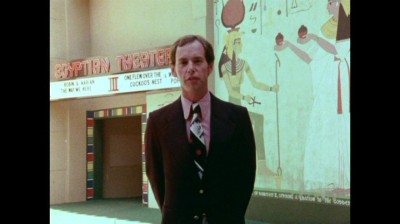
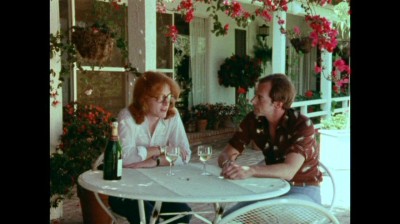
Setting up this loose narrative framework, Whitcomb is shown attending the ritzy opening gala for "British Fortnight in Los Angeles," arriving in his battered Oldsmobile Toronado and wearing a Mickey Mouse tie and a Bicentennial sweater, a finger-in-your-eye "costume" that doesn't go unnoticed by the supposed crème de la crème of British society in Los Angeles, such as the visiting U.K. Ambassador, Sir Peter Ramsbotham. Milling around with the black tie crowd, Whitcomb corners two of the gala's organizers to find out exactly which big-name British celebrities are there, only to discover that Roger Moore and Cary Grant have declined, but that Nanny and the Professor star Juliet Mills is there...until the organizer admits that she was at least scheduled to appear. Next, a trip to the Beverly Hills mansion of former pop star-turned-millionaire-music-producer Peter Asher, of Peter and Gordon fame, finds yet another L.A. British bigwig who has no idea "British Fortnight" is going on, before Whitcomb attends the sadly, comically under-attended British "Commonwealth Games" in a Van Nuys athletic field, where Americans, not British émigrés, play cricket and bash each other in mock medieval jousting matches (the interview with the British organizer who laments that the games are complete "rubbish" is hysterical).
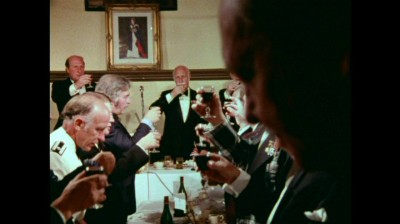
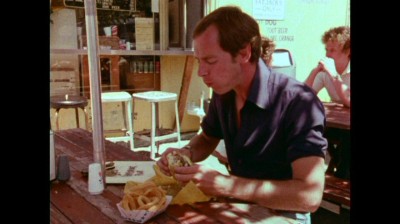
Some of these bits don't come off as well as they could have, lacking commentary on the doc's central theme as they veer off into travelogue territory (the Will Rogers Polo Club and Tudor House tea room segments, in particular), but those are isolated moments as Whitcomb and director Haydon pull out funny, telling little moments that make the case that England's pull on its émigrés can't survive in the seductive California heat. While ginger-haired ex-British Empire soldier-turned-repair-shop-owner Scotty is still loyal enough to his homeland to refuse to work on Whitcomb's American car...he recognized early on that "welfare state" England held little opportunity for a man of his ambitions (he'd be turning over in his grave if he saw welfare state par excellance California today...). The formal black-tie dinner at the British United Services Club, where soon-to-be blackballed member Whitcomb (attired in a sure-to-offend animal print jacket) sings a naughty music hall number to his older, stuffy, reserved audience, is a highlight of cultures clashing, while Whitcomb's interviews with actor-turned-nude male "art" photographer Roy Dean (In Search of Adam) and model-turned-female pornographer Suze Randall, illustrate the A to B reach of Hollywood's cultural endeavors (Randall's shoot is quite sexy). Through this all, Whitcomb blithely welcomes his cultural transformation in this sun-drenched Eden, laughing and splashing around in Randall's pool as she tries to get his knickers off, while director Haydon brackets the doc with the image of a Mickey Mouse alarm clock (unfortunately fuzzed out digitally by Scorpion, no doubt to appease the jack-booted thugs at Disney), inexorably ticking down the waning influence of England's culture over its wayward colonists.
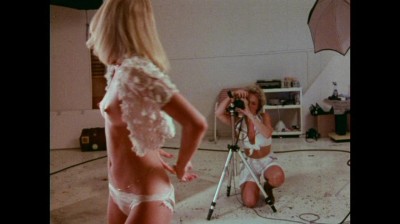
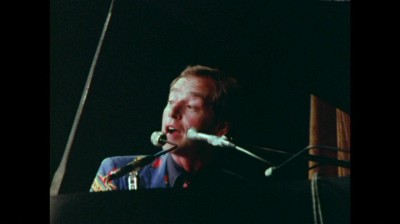
The DVD:
The Extras:
There's a full-length commentary track with Ian Whitcomb, moderately (nicely) by Katarina Leigh Waters (Scorpion's own movie host). Whitcomb sounds just as bemused with his situation as he did 35 years ago, and he gives some interesting background on the doc's production...although I personally enjoyed it more when he kept a running tally of who in the film has since died ("There's Brian Clewer...he's dead. They're all dead.")
Final Thoughts:
Light, funny, slightly mocking documentary that twists the expected alien fish-out-of-water narrative and finds instead an Englishman openly embracing his new, carefree lifestyle in California. The obscure BBC doc L.A.―My Home Town is a real find that should please Anglophiles and TV lovers of anything British. I'm highly, highly recommending L.A.―My Home Town.
Paul Mavis is an internationally published film and television historian, a member of the Online Film Critics Society, and the author of The Espionage Filmography.


|
| Popular Reviews |
| Sponsored Links |
|
|
| Sponsored Links |
|
|
| Release List | Reviews | Shop | Newsletter | Forum | DVD Giveaways | Blu-Ray | Advertise |
|
Copyright 2024 DVDTalk.com All Rights Reserved. Legal Info, Privacy Policy, Terms of Use,
Manage Preferences,
Your Privacy Choices | |||||||











